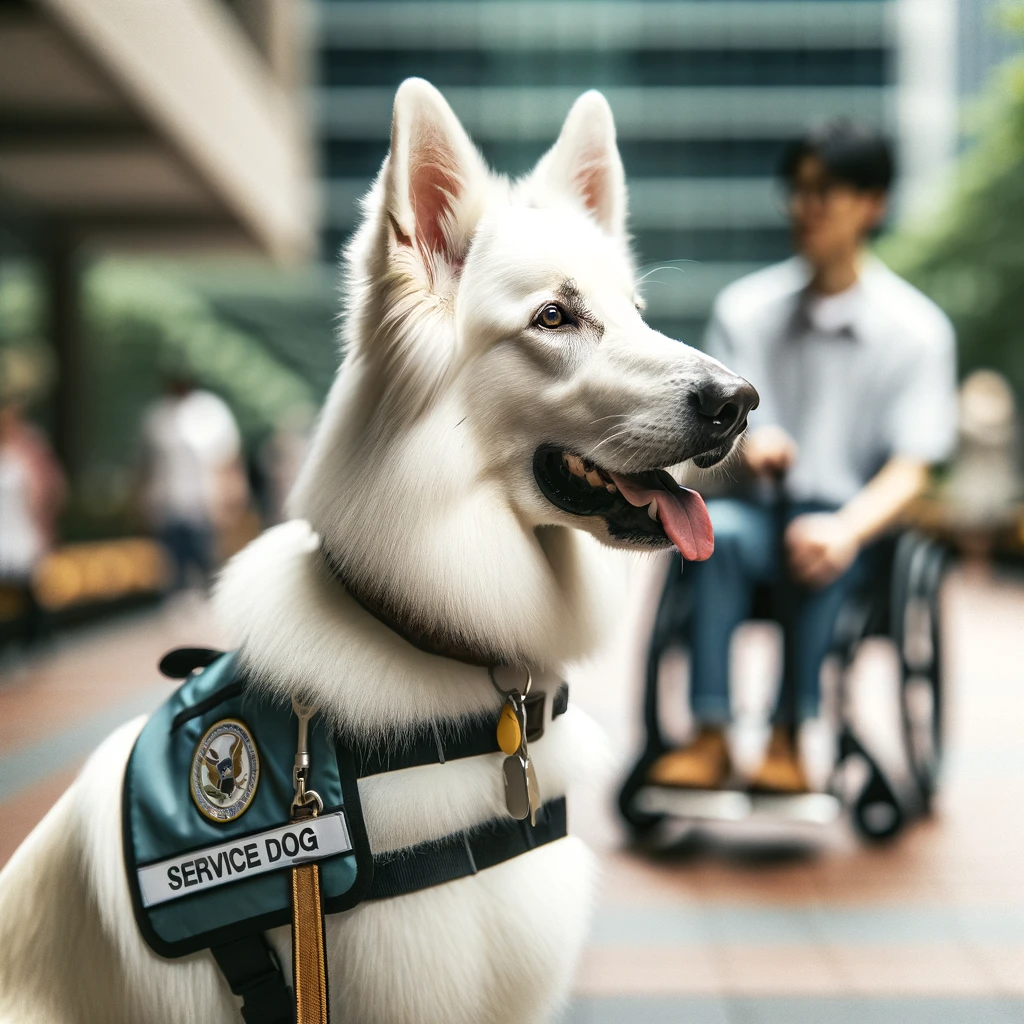In this article, we will uncover the truth about White Shepherds as service dogs. With their striking appearance and gentle demeanor, many wonder if they possess the qualities necessary to excel in this important role. Are they capable of providing the assistance and support needed by individuals with disabilities? Let’s explore the unique characteristics and abilities that make White Shepherds a potential choice for service dog work.
Benefits of White Shepherds as Service Dogs
Intelligence and Trainability
One of the primary reasons that White Shepherds make excellent service dogs is their high level of intelligence and trainability. These dogs are known for their ability to quickly grasp new commands and tasks, making them highly responsive to training. Their intelligence allows them to understand and carry out complex tasks, which is crucial for many service roles.
Strong Work Ethic
White Shepherds are known for their strong work ethic, making them well-suited for service work. These dogs are eager to please their handlers and are highly motivated to perform their tasks effectively. They take their responsibilities seriously and are committed to fulfilling their duties with diligence and dedication.
Gentle and Versatile Temperament
In addition to their intelligence and work ethic, White Shepherds possess a gentle and versatile temperament that is essential for service dogs. They are typically friendly, calm, and patient, which allows them to handle a variety of situations with ease. This temperament also makes them well-suited for working with individuals of different ages and abilities, as they are adaptable and sensitive to the needs of their handlers.
Physical Traits of White Shepherds
Appearance
White Shepherds are elegant and striking dogs with a strong and athletic build. They have a regal and noble appearance, with a well-proportioned body and a confident posture. Their white coat stands out and adds to their majestic appearance, making them easily recognizable.
Coat Type and Maintenance
The coat of a White Shepherd is typically medium to long in length and is dense, straight, and weather-resistant. While their coats require regular grooming to keep them clean and free from tangles, they do not require excessive maintenance. Regular brushing to remove loose hair is usually sufficient, although additional care may be needed during shedding seasons.
Size and Strength
White Shepherds are medium to large-sized dogs, with males typically being larger and more muscular than females. They have a strong and sturdy build, which gives them the strength and endurance needed for service work. Their size allows them to provide stability and support to their handlers, making them well-suited for tasks that require physical assistance.
Training White Shepherds for Service Work
Basic Obedience Training
Before embarking on specific service training, it is essential to ensure that White Shepherds have a solid foundation in basic obedience training. This includes commands such as sit, stay, come, and walking on a leash without pulling. Basic obedience training teaches the dog to be responsive and well-behaved, laying the groundwork for more advanced training.
Task Training
Once basic obedience is established, White Shepherds can begin their task-specific training. This includes teaching them the specific tasks they will need to perform to assist their handlers. For example, guide dogs for the visually impaired are trained to navigate obstacles and follow directional commands, while hearing dogs for the deaf are trained to alert their handlers to sounds such as doorbells or fire alarms.
Socialization and Public Access Training
Socialization is a crucial aspect of training for any service dog. White Shepherds should be exposed to various environments, people, and animals to ensure they can remain calm and focused in different situations. Public access training is also essential, as service dogs must be well-behaved and comfortable in public places. This type of training teaches the dog to ignore distractions and maintain their focus on their handler.
Specific Service Roles for White Shepherds
Guide Dogs for the Visually Impaired
White Shepherds have proven to be excellent guide dogs for individuals who are visually impaired. Their intelligence and ability to navigate obstacles make them well-suited for this role. They are trained to lead their handlers safely through various environments, providing them with independence and the assurance of staying out of harm’s way.
Hearing Dogs for the Deaf
White Shepherds can also be trained as hearing dogs for individuals who are deaf or hard of hearing. Their alert and attentive nature makes them well-suited for this task. They are trained to recognize and respond to specific sounds, such as doorbells or emergency alarms, and to alert their handlers accordingly.
Mobility Assistance Dogs
White Shepherds are highly capable of providing mobility assistance to individuals with physical disabilities. They can be trained to retrieve objects, open doors, or even assist with balance and stability while walking. Their strength and endurance make them valuable partners for those who require physical support in their daily lives.

Challenges and Considerations
Potential Health Issues
Like all dog breeds, White Shepherds are prone to certain health issues. It is essential to consider these potential health problems when selecting a White Shepherd for service work. Some common health concerns include hip and elbow dysplasia, allergies, and certain genetic conditions. Regular veterinary care and appropriate health screenings can help mitigate these risks.
Shedding and Allergies
White Shepherds have a thick double coat that sheds moderately throughout the year. While regular grooming and brushing can help manage shedding, it is important to note that these dogs may not be suitable for individuals with severe allergies. Allergy testing and exposure to White Shepherds before acquiring one as a service dog is recommended.
Prejudice and Stereotypes
Another challenge faced by White Shepherds and their handlers is prejudice and stereotypes from the public. Due to their resemblance to certain breeds that have negative connotations, White Shepherds can sometimes be met with skepticism or fear. It is crucial to educate and raise awareness about the positive attributes of White Shepherds as service dogs to overcome these prejudices.
Suitability for Service Work
Individual Personality and Temperament
While White Shepherds, in general, possess qualities that make them well-suited for service work, it is essential to consider each dog’s individual personality and temperament. Not all White Shepherds will be suitable for service work, as some dogs may have specific traits or characteristics that may impede their ability to perform certain tasks. Evaluating the temperament and aptitude of each individual dog is crucial for their success as a service dog.
Handler’s Needs and Lifestyle
The needs and lifestyle of the potential handler should also be taken into account when considering a White Shepherd as a service dog. Assessing the handler’s physical limitations, living environment, and daily routines can help determine if a White Shepherd is the right fit. It is important to ensure that the dog’s abilities align with the tasks and support required by the handler.
Availability of Training Resources
Training a White Shepherd for service work requires dedication, time, and resources. It is essential to consider the availability of professional trainers, training facilities, and support systems in the local area. Access to appropriate resources can greatly enhance the training experience and increase the likelihood of success for both the dog and the handler.
Success Stories of White Shepherds as Service Dogs
Case Study 1: Guide Dog for a Blind Individual
Sam, a White Shepherd, was trained as a guide dog for John, a visually impaired individual. Sam’s intelligence and work ethic allowed him to quickly learn the necessary skills to navigate various environments and provide John with a newfound sense of independence. Together, they became a confident and efficient team, successfully overcoming obstacles and improving John’s quality of life.
Case Study 2: Hearing Dog for the Deaf
Luna, a White Shepherd, was trained as a hearing dog for Emily, who is deaf. Luna’s excellent hearing and attentive nature made her the perfect companion for Emily. She quickly learned to recognize and alert Emily to important sounds in their environment, allowing Emily to feel more secure and connected to the world around her.
Case Study 3: Mobility Assistance Dog
Max, a White Shepherd, was trained as a mobility assistance dog for Sarah, who has a physical disability. Max’s strength and versatility enabled him to provide Sarah with the physical support she needed in her daily life. He learned to retrieve objects, open doors, and even assist with stability while Sarah walked, greatly enhancing her independence and confidence.
Choosing a White Shepherd for Service Work
Identifying Reputable Breeders
When selecting a White Shepherd for service work, it is crucial to work with a reputable breeder who prioritizes health, temperament, and the breed standard. Reputable breeders carefully select breeding pairs, conduct health screenings, and provide thorough socialization for their puppies. Seek recommendations from experienced dog trainers or service dog organizations to find a reputable breeder.
Health and Genetic Testing
To ensure the health and well-being of a White Shepherd intended for service work, health and genetic testing should be conducted. This includes screening for hip and elbow dysplasia, as well as testing for common genetic conditions that are prevalent in the breed. The results of these tests will help determine the overall health and suitability of the dog for service work.
Temperament Evaluation
Assessing the temperament of a White Shepherd is crucial when choosing a candidate for service work. Temperament evaluations can help determine if the dog possesses the necessary traits, such as calmness, focus, and confidence, that are essential for success in service roles. Professional trainers or behaviorists experienced in evaluating working dogs can provide valuable insights during this process.
Conclusion
White Shepherds have proven themselves to be exceptional service dogs, with their intelligence, trainability, and gentle temperament making them well-suited for a range of service roles. Their physical traits, including their appearance, coat type, and size, further contribute to their suitability for service work. While there may be challenges and considerations to address, the success stories of White Shepherds as service dogs highlight their incredible abilities and the positive impact they can have on the lives of their handlers. By selecting a White Shepherd with the right temperament, considering the handler’s needs, and utilizing available training resources, individuals can find a loyal and capable service partner in this remarkable breed.

